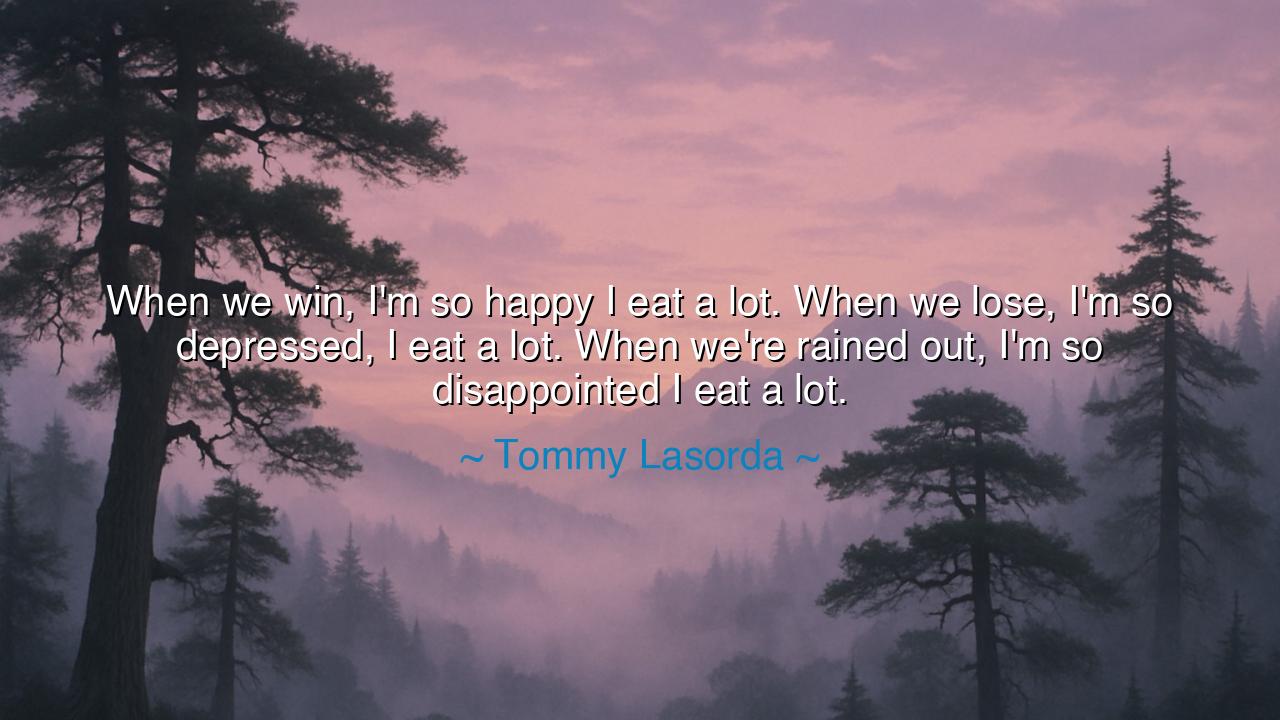
When we win, I'm so happy I eat a lot. When we lose, I'm so
When we win, I'm so happy I eat a lot. When we lose, I'm so depressed, I eat a lot. When we're rained out, I'm so disappointed I eat a lot.






When Tommy Lasorda, the legendary baseball manager, declared, “When we win, I'm so happy I eat a lot. When we lose, I'm so depressed, I eat a lot. When we're rained out, I'm so disappointed I eat a lot,” he did so with the warmth and humor of a man who had lived deeply and loved fiercely. Yet beneath the laughter lies a truth known since the dawn of time — that the heart, in its longing for comfort, often seeks solace in excess. In these words, Lasorda captures the paradox of human desire: that whether in joy, sorrow, or boredom, we are drawn toward the familiar act of consumption, as though it might fill the emptiness that neither victory nor defeat can satisfy.
Lasorda was a man of immense passion — for the game, for life, for people. His humor was his wisdom, his way of revealing the small absurdities that unite us all. In this statement, he does not mock himself, but rather illuminates the human condition. We are creatures of appetite, and not only for food. We hunger for meaning, for victory, for belonging. When these are denied or fleeting, we turn to the nearest comfort — a meal, a pleasure, a distraction. Lasorda’s confession becomes a parable: joy and despair both drive us to the same table, because the deeper hunger — the hunger of the soul — remains unsatisfied.
This truth was known even to the ancients. The philosopher Epicurus taught that pleasure is not found in abundance but in balance, and that the wise man learns to distinguish between what the body wants and what the spirit needs. Lasorda’s words, though humorous, echo this timeless wisdom. The laughter hides the longing. To eat “a lot,” no matter the circumstance, is to admit that one’s joy and sorrow are ungoverned, that the heart still seeks to fill its emptiness with what fades quickly. It is a mirror of the human struggle — the battle between the fleeting comfort of the senses and the lasting nourishment of the soul.
History offers us many such examples. Consider King Henry VIII, who, in times of triumph and tragedy alike, found solace at the banquet table. His victories were celebrated with feasts that never ended, and his defeats were drowned in the same excess. Yet his gluttony, symbolic of his inability to control his appetites — political, emotional, or physical — became the undoing of both his body and his reign. Like Lasorda’s jest, Henry’s story reminds us that when the heart does not find moderation, success and failure both lead to overindulgence. Victory without gratitude and defeat without reflection both feed the same emptiness.
And yet, there is tenderness in Lasorda’s humor. He does not preach restraint as a saint would, but reveals vulnerability with laughter. In doing so, he teaches something profound: to recognize one’s own absurdity is the beginning of wisdom. The man who can laugh at his own weakness is no longer ruled by it. This self-awareness is the first step toward transformation. For though Lasorda jokes of eating through every emotion, his words remind us that awareness, not denial, is what redeems human frailty.
There is also love hidden in his humor — love for the game, for life itself. For Lasorda, baseball was not merely sport, but a mirror of existence, with its triumphs, defeats, and unpredictable storms. When he says he eats through them all, he is, in truth, saying that he feels through them all. His appetite for food is but a reflection of his appetite for life — unrestrained, passionate, fully human. The danger, as with all passions, lies not in feeling deeply, but in failing to guide those feelings toward wisdom and gratitude.
Thus, the lesson of Tommy Lasorda’s words is twofold. First, recognize the hunger beneath your actions — the true hunger, which is not for food but for peace, purpose, and connection. And second, learn to transform that hunger into something higher. When you win, celebrate with gratitude, not excess. When you lose, find comfort in reflection, not escape. When the world disappoints you, remember that nourishment is not only of the body, but of the heart and spirit.
For in the end, the wise do not eat to fill a void; they eat to honor life itself. And the truest feast, as Lasorda’s laughter reminds us, is not the one spread before us on the table — it is the one we share with understanding, humility, and joy.






AAdministratorAdministrator
Welcome, honored guests. Please leave a comment, we will respond soon